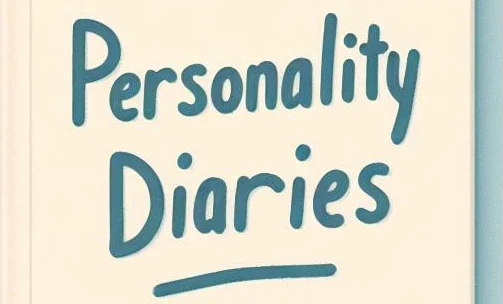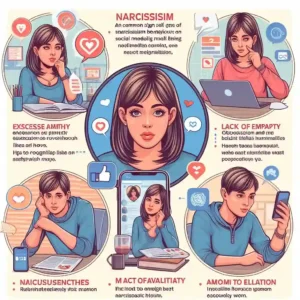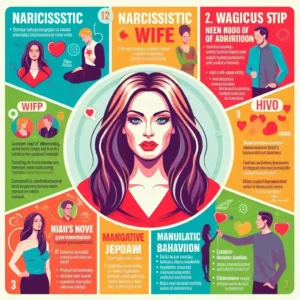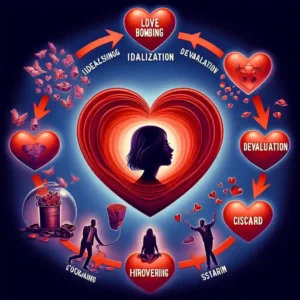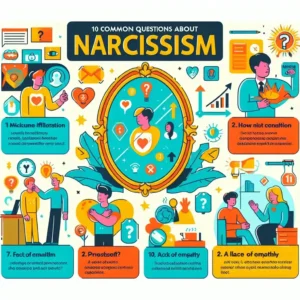You’re initially swept off your feet by the charming, charismatic partner who showers you with grand romantic gestures and affection. It’s a whirlwind romance that leaves you feeling seen, heard, and loved. But as the days turn into weeks, and the weeks into months, you start to notice subtle changes in their behavior.
They become overly critical, making snide comments about your appearance or accomplishments. You begin to feel like you’re walking on eggshells, never knowing what will trigger their anger or disappointment.
What’s really going on behind their charming facade, and how can you protect yourself from the toxic dynamics that are unfolding?
In a Nutshell

- A narcissistic relationship often begins with an intense idealization phase, characterized by grand romantic gestures and excessive flattery.
- The honeymoon phase is short-lived, and subtle manipulation and control tactics emerge, disguised as concern or helpfulness.
- Gaslighting and emotional abuse follow, as the narcissist distorts reality, erodes emotional stability, and creates dependence.
- Blame-shifting and projection occur when the narcissist deflects accountability, making the partner feel responsible for their mistakes and emotions.
Idealization and Grand Romantic Gestures
As you enter a narcissistic relationship, you’re likely to be swept off your feet by an intense period of idealization, characterized by grand romantic gestures that are carefully designed to win you over and gain your admiration.
This is often referred to as ‘love bombing,’ where your partner showers you with excessive attention and affection to create a strong emotional bond.
Over-the-top displays of romance, such as surprise getaways or lavish gifts, are common tactics used to captivate and impress.
These grand gestures aren’t genuine expressions of love, but rather a means to an end.
Your partner is trying to hook you emotionally, making you dependent on their validation and approval.
Be cautious of these manipulative tactics, as they can be incredibly alluring and difficult to resist.
Remember, a healthy relationship is built on mutual respect, trust, and open communication, not on grand romantic gestures designed to control and manipulate.
Crucial to recognize these signs early on is to avoid getting trapped in a toxic dynamic.
The Honeymoon Phase of Bliss
You’re now basking in the honeymoon phase of bliss, where your partner’s grand romantic gestures have successfully created an intense emotional high, making you feel like you’re walking on air.
This is the peak of the idealization stage, where the narcissist’s charm and charisma have you completely swept off your feet.
The intense attraction you feel is likely mutual, and it’s not uncommon for the narcissist to engage in love bombing – showering you with excessive attention and affection to quickly build an emotional connection.
They may lavish you with gifts, take you on romantic getaways, or write love letters to win your heart.
As you bask in the glow of this newfound love, it’s crucial to bear in mind that this phase is often short-lived.
The narcissist’s ultimate goal is to hook you emotionally, making it difficult for you to leave the relationship when the cracks begin to show.
For now, enjoy the ride, but keep your eyes open and your wits about you.
Subtle Manipulation and Control
Your narcissistic partner’s subtle manipulation and control tactics begin to emerge, often disguised as concern or helpfulness, but ultimately aimed at chipping away at your autonomy and independence. They might make seemingly innocuous comments, like ‘I’m only saying this because I care about you,’ or ‘I’m trying to help you become a better person.’ However, these statements are laced with emotional hooks, designed to make you feel grateful, obligated, or even guilty.
As you become more invested in the relationship, you start to notice passive-aggressive behaviors, such as sulking, door-slamming, or giving you the silent treatment. These actions are meant to control your emotions and reactions, making you feel like you’re walking on eggshells to avoid conflict. Your partner might also start to ‘accidentally’ forget important details or make ‘honest mistakes’ that benefit them, further eroding your sense of trust and control.
It’s essential to recognize these subtle manipulation tactics for what they’re – an attempt to exert power over you. By acknowledging these behaviors, you can begin to regain your autonomy and set boundaries to protect yourself from further emotional manipulation.
Gaslighting and Emotional Abuse
Gaslighting, a pernicious form of emotional abuse, enters the scene, where your narcissistic partner deliberately distorts reality, making you question your own perceptions, memories, and sanity.
This manipulation is designed to erode your emotional stability, creating a sense of uncertainty and dependence on them.
You start to doubt your own feelings, thoughts, and experiences, and may even begin to wonder if you’re overreacting or being too sensitive.
This emotional erosion can lead to trauma bonding, where you become emotionally tied to your abuser, feeling a twisted sense of loyalty and obligation to them.
As the gaslighting continues, you may start to feel like you’re walking on eggshells, constantly trying to avoid conflict or criticism.
Your self-confidence and self-worth slowly dwindle, and you may begin to feel like you’re losing your grip on reality.
Remember, this isn’t your fault.
It’s crucial to acknowledge the signs of gaslighting and take steps to break free from this toxic dynamic.
The Blame-Shifting and Projection Stage
As the relationship progresses, your narcissistic partner masterfully deflects accountability, shifting blame onto you and projecting their own flaws and misdeeds onto your shoulders.
You start to feel like you’re walking on eggshells, never knowing what’ll trigger their next outburst or accusation.
They’re experts at guilt transference, making you feel responsible for their mistakes and emotions.
You’re left wondering if you’re indeed the problem, if you’re the one who’s flawed or crazy.
Don’t be fooled – this is a classic tactic of deflecting accountability.
Your partner is avoiding responsibility for their actions, and instead, placing the burden on you.
They might say, ‘You’re too sensitive’ or ‘You’re overreacting’ to shift the focus from their own behavior.
Remember, you’re not the issue; their inability to take responsibility is.
Recognize the pattern and don’t internalize their projections.
You didn’t cause their problems, and you can’t fix them either.
Stay grounded, and remind yourself of the facts.
The more you understand this stage, the closer you’ll be to breaking free from the toxic cycle.
Discard and Abandonment
In the discard and abandonment stage, narcissistic partners suddenly and without warning sever emotional ties, leaving you feeling utterly bewildered and discarded.
This stage is marked by a complete disconnection, where your partner’s interest in you vanishes, and you’re left wondering what went wrong. The toxic silence is deafening, as your partner’s emotional unavailability becomes palpable.
You may try to reach out, but your efforts are met with indifference or hostility.
During this stage, your partner is engaging in emotional purging, ridding themselves of any emotional investment in you.
Recognizing that this behavior isn’t about you is vital; it’s a calculated move to maintain their emotional distance and control.
You may feel confused, anxious, or desperate, but resisting the urge to beg for attention or affection is pivotal.
Instead, focus on self-care, self-compassion, and rebuilding your sense of identity.
Remember, you deserve better than to be treated like a disposable object.
Take this opportunity to break free from the toxic dynamic and start your journey towards emotional liberation.
Frequently Asked Questions
Can Narcissists Truly Love or Are They Always Manipulative?
You wonder if narcissists can truly love, but their toxic attachment patterns and emotional unavailability suggest they’re more invested in controlling and manipulating others than forming genuine connections, leaving you questioning their capacity for authentic love.
Why Do Narcissists Often Target Empaths and Highly Sensitive People?
You often attract narcissists because, as an empath or highly sensitive person, you naturally emit emotional resonance, which they exploit to create trauma bonding, manipulating your empathy to fuel their supply of admiration and control.
Can I Change a Narcissist or Fix Their Bad Behavior?
You can’t change a narcissist or fix their bad behavior, as it’s a deeply ingrained personality flaw. Behavior modification is unlikely, as they resist accountability and blame-shifting is a hallmark of their coping mechanism.
How Do I Cope With the Guilt and Shame After Leaving a Narcissist?
You confront the guilt and shame by practicing self-reflection exercises to reframe your narrative, and engage in healing rituals like journaling, meditation, or creative expression to process emotions, ultimately reclaiming your autonomy and self-worth.
Are Narcissistic Personality Disorders Treatable With Therapy?
You’re wondering if therapy can treat narcissistic personality disorders; research suggests it’s challenging, but possible. Effective therapy goals focus on increasing empathy, self-awareness, and emotional regulation, leading to improved treatment outcomes, though progress may be slow and require consistent effort.







James Green is a seasoned psychologist specializing in narcissism and other personality and relationship issues. With a passion for helping others understand and navigate their own personality traits and relationships, James shares his insights and expertise on his blog, Personality Diaries. Connect with him on Pinterest and Instagram for regular updates and insights.
